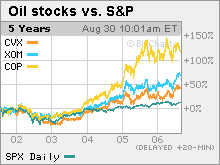|
Bailing on Big Oil Oil stocks just won't quit, but with crude prices slowing along with the economy, is now the time to sell? NEW YORK (CNNMoney.com) -- Oil stocks are showing no signs of slowing down. Exxon Mobil (Charts) and Royal Dutch Shell (Charts) hit new all-time highs last week, and Chevron (Charts) did so a few weeks ago.
Of course, the stock performance of energy companies closely follows the price of oil. But some analysts think that crude prices may be nearing their peak. Combine this with fears of a global economic slowdown and energy stocks that have been flying high for several years, and it begs the question: Is now the time to sell? The case for cashing out Some think investors would be wise to pay attention to the investing mantra of buying low and selling high. Larry Peruzzi, a senior equity trader at The Boston Company Asset Management, said that because energy stocks have done so well for the past few years, they may soon be due for some time on the sidelines. Investors may start paying more attention to neglected sectors like tech or financials. "For this market to get to the next level we need some type of leadership change," he said. Then there's the price of oil. Crude prices have more than doubled since 2001, and some argue that oil prices should start declining in the next couple of years. Tight supplies and strong demand for oil have pushed up prices to record highs over the past few years. But these record prices have also provided oil companies the capital and impetus to go looking for more oil, and it has made supplies that were once too expensive to extract suddenly profitable. For this reason, some analysts think prices should come down thanks to the increased output coming from these new ventures. Perhaps an even greater threat to oil prices is the possibility of an economic slowdown. The U.S. economy has been growing steadily over the past several years. But cooling housing prices and sinking consumer confidence have some economists concerned. A slowing economy would not be good news for oil stocks or other commodity stocks, said Jack Ablin, chief investment officer at Harris Private Bank in Chicago. But wait But Ablin also stressed that lumping oil together with other commodities was a dicey proposition, as "predicting where oil prices will go is akin to alchemy." And that's where the oil bulls come in. There is no shortage of people who think oil prices will remain high. "I hate to recommend any stocks when they are at their all-time highs," said Brian Gendreau, an investment strategist at ING Investment Management. "But the long-term case for any commodity producer, including oil, is pretty good. The demand is just so strong." Some say China and India will continue to be big consumers of oil, regardless of what happens in the United States. "I'm not worried about global economic growth," said Fadel Gheit, an energy analyst at Oppenheimer. "Growth in China is for generations. They are the driver." Gheit adds that even if the economy does slow down, sticking with the oil majors would not be a bad idea. "If we have a pullback in commodities and stocks in general, then there will be a flight to quality," he said. "Then the Exxons, the Chevrons, the BPs (Charts) will be considered a safe haven." That's because many Big Oil companies have used their record profits to pay down debt, buy back shares and raise their dividends. Chevron and BP both have dividends that yield more than 3 percent. And compared to other sectors, oil stocks still look like a bargain. Exxon Mobil is trading at only 11 times earnings estimates for the next four quarters while BP, Chevron and ConocoPhilllips (Charts) all trade for less than 10 times estimates for the next 12 months. The S&P 500, by way of comparison, trades at 15 times earnings estimates for the next four quarters. "There could be some softness in the short term, said Bruce Lanni, a senior oil analyst at A.G. Edwards. "But it would be difficult to justify a sell rating on those stocks unless you truly believed in a [coming] global recession or collapse in demand." |
|



